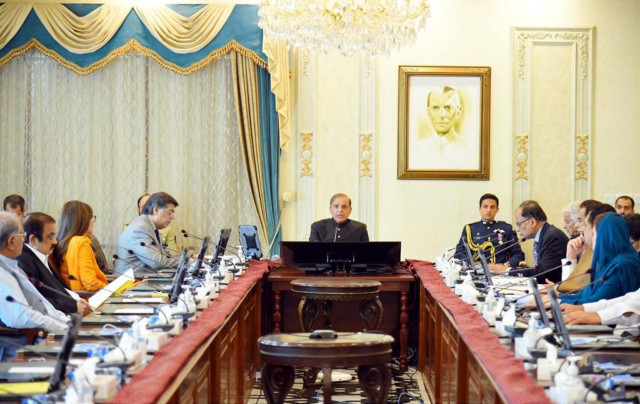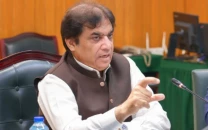ECC sanctions Rs24b for supplementary budget
Funding will help pay liabilities of government, clear backlog

The Economic Coordination Committee (ECC) of the cabinet on Thursday approved Rs24 billion in a supplementary budget to pay off liabilities of the government and clear the backlog developed due to the unrealistic annual allocations.
Finance secretary conveyed to the forum that in future the finance ministry would discourage the approval of even technical supplementary grants aimed at maintaining the fiscal discipline. Technical supplementary grants have been approved by utilising the contingency funds.
Finance Minister Muhammad Aurangzeb chaired his first meeting of the ECC, which was also the first meeting of the cabinet body under the new coalition government. The ECC has the mandate to take decisions on critical economic matters.
It approved at least nine supplementary grants and the additional money was provided for the provision of subsidised wheat flour and oil, separation scheme for employees of SME Bank, subsidy on wheat for Gilgit-Baltistan, settling the outstanding media dues, repair of a VVIP helicopter, procurement of uniforms, establishment of new battalions and matching funds of education sector loans.
In his maiden meeting as the ECC Chairman, Aurangzeb took decisions that carried financial implications of Rs24 billion.
The ECC resolved that the forum should be used for making important economic decisions instead of spending time on issuing budget to various ministries.
Pakistan has agreed with the International Monetary Fund (IMF) that it will not release any additional supplementary grant. The Rs24 billion worth of grants, approved by the ECC, were technical in nature that would be released out of the contingency funds.
The government approved Rs7 billion in additional subsidy for the people of Gilgit-Baltistan, taking total funding under the category to Rs16.5 billion for the current fiscal year, according to officials.
The federal government provides wheat at a subsidised rate of Rs20 per kg to the consumers of the special region against the local cost of Rs106.
The government had allocated a subsidy of Rs9.5 billion for the provision of 150,000 tons of wheat in the budget. But due to the increase in prices, the allocation was fully utilised by the end of March.
The ECC approved Rs4.1 billion to pay off liabilities of the employees of SME Bank, which was being closed. Out of this, an amount of Rs3.3 billion will be given for the separation of 136 employees.
Earlier, the Pakistan Democratic Movement (PDM) government had decided to wind up the bank.
The ECC approved Rs5 billion in additional budget for the supply of wheat flour and cooking oil to the government-run utility stories. An amount of Rs7.5 billion had been allocated in the budget but Prime Minister Shehbaz Sharif decided to earmark an additional budget for the provision of subsidised commodities.
The additional Rs5 billion will be utilised to sell wheat flour at Rs65 per kg, about half the market price, and give a subsidy of Rs100 per kg on ghee. The Rs5 billion additional funds were allocated out of the Rs30 billion PM relief package.
The government approved Rs1.6 billion in a supplementary budget to clear the outstanding dues of media houses on account of old advertisement campaigns. Media houses were facing problems in paying salaries to their employees due to the delay in payments by the federal government and the government of Punjab.
Funds have been diverted from the film finance fund and the artist health insurance scheme and they do not carry any additional impact on the budget deficit.
The ECC approved Rs3.8 billion to cover up a foreign loan for the Higher Education Commission. HEC informed the meeting that it did not have room to provide matching funds from its existing allocation.
The ECC approved a grant of Rs1.7 billion for the Passport Office employees serving abroad. The employees were facing problems in getting salaries due to the less-than-required allocation in the budget. The unrealistic budgeting often leads to the issuance of supplementary grants.
The government approved Rs300 million in a supplementary grant for Pakistan Rangers for the procurement of uniforms. The Rangers was also facing problems due to the less-than-required allocation.
The government also approved Rs103 million for the Frontier Corps Balochistan to repair a VVIPs’ helicopter.
Another Rs433 million was approved for Pakistan Coast Guards to raise one more battalion for an anti-smuggling drive. The decision to create two battalions had been taken in 2019 but funds were not allocated on time.
Published in The Express Tribune, April 5th, 2024.
Like Business on Facebook, follow @TribuneBiz on Twitter to stay informed and join in the conversation.


















COMMENTS
Comments are moderated and generally will be posted if they are on-topic and not abusive.
For more information, please see our Comments FAQ